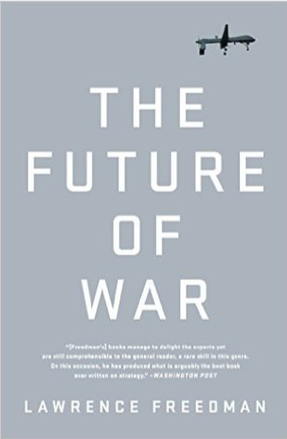In The Future of War: A History, Sir Lawrence Freedman, Emeritus Professor of War Studies at King’s College, London, takes readers on an unorthodox study of how the ‘future’ of war has been predicted, fictionalised and marketed throughout the course of human history; describing how past generations have envisioned their respective future conflicts and drawing parallels to a contemporary growth of military futurism. While the title of the book may seem incongruous, it isn’t until the closing chapters that it dawns on the reader that the book is just as it states—a history of the future of war, transcending the need to make its own predictions for the current age.
Freedman concentrates his analysis on both professional and amateur assessments of the direction of conflict over the past century. The book focusses attention on how militaries and societies have anticipated the potential for armed conflict as well as how new technologies and changes to the global order have been considered (or have failed to be considered) among the various influences on ‘future conflicts’ of each age. As a result, Freedman’s work emphasises the importance of innovation and underwrites why constant learning, discussion and a body of predictive writing about future security challenges is critical to success in the face of unknown threats—particularly those malign actors yet to present themselves. As Freedman states, ‘history is made by people who do not know what is going to happen next.’
While many of the book’s case studies relate to premonitions of generals, political leaders, spies and nuclear strategists of the 20th Century, Freedman also highlights the predictive value of fictional authors from Arthur Conan Doyle and H.G. Wells to P.W. Singer and August Cole. Examples of these divinations include 1920s authors who described how ‘atomic smog’ might be used in the coming decades to destroy entire cities; Arthur Conan Doyle’s prediction in 1914 that German submarines would target civilian liners and merchant vessels; or a 1930s article that argued the US Pacific Fleet was increasingly vulnerable to a sneak attack from Imperial Japan. Freedman explores how Wells’ famous War of the Worlds was informed by his research of colonial genocides and as such highlighted the Panglossian view espoused in the ‘Revolution of Military Affairs’ debates that followed Desert Storm (that technological change offers the potential for quick and decisive victories). As such, Freedman suggests that the fundamental purpose of many claims about the future of war have less to do with prediction and more to do with influence.
Just as Freedman highlights those who have shown clairvoyance in predicting the nature of future wars, Freedman criticises those who have argued that war is a dying anachronism—such as the Nobel Peace Prize laureate Norman Angell—whose book claiming that the ‘economic futility of war would ensure it never occurred again’, was released only a few months before the initial salvos of the First World War.
All the while, Freedman uses his half-century of experience at the forefront of national security debates to highlight the logical flows from imperial conflicts to modern challenges such as terrorism, offensive cyber capabilities and even violent criminality. At the same time, Freedman argues against what he sees as the tendency for national leaders, militaries and industry to look toward the next technological ‘silver bullet’. As such he argues against what he considers as a general tendency for futurists and military / strategic practitioners to focus on technological changes and their impact on war, without due consideration to the factors influencing conflict—what he describes as a general inclination toward focussing on the changing character of war, while ignoring its enduring nature. Unsurprisingly, Freedman, having dedicated his life to studying wars, does not expect the phenomenon to disappear from the list of characteristics of the human condition.
Ultimately, Freedman’s book underwrites why professional military education and deliberate consideration of future challenges is so important. The Future of War: A History is an excellent retort to those who remain resistant to the rise of professional military discussion, its growing online community / the NatSec Twittersphere and the predictive value of military futurism and fiction.
Thinking about thinking about the future of war:
- In considering future war do we focus too readily on future technology?
- If so, are we ignoring the socio-political drivers of the next conflict that also influence how it will be fought?
- Are characterisations such as ‘multi-dimensional’, ‘hybrid threats’, ‘non-linear subversion’ etc useful in considering future war or do they reflect a general tendency to view each conflict as typifying a new model?
- Are characterisations of this nature merely describing traditional competition framed within the political appetite and expediency of the time—to undermine opponents while avoiding direct confrontation?
About the author:
James Bedogni is an officer in the 6th Combat Support Brigade, Australian Army

